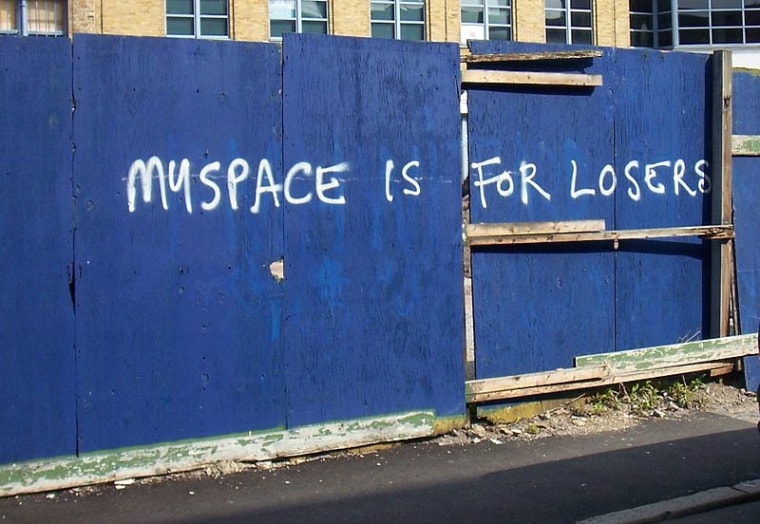 Photo: Mark Skipper
Photo: Mark Skipper
When I saw the news that Myspace had lost 12 years and an estimated 50 million songs worth of music as well as photographs and videos due to a "server migration project," the surly asshole in me was awoken: What a monumental loss to culture that all those embarrassing emo songs and photos of scene haircuts are now gone.
But the digital archivist in me knew that there were songs of personal and cultural value lost, and it stimulated my interest in the ways that digital preservation intersects with ethical issues, as well as how the models of digital preservation have changed over time. Myspace represents an odd vestige of a more trusting time in music streaming — a largely forgotten repository for some artists, to the point that some musicians I recently spoke with responded apathetically about their missing songs. As Natasha El-Sergany of somesurprises, simply put it to me: “not mad.”
In a series of tweets this past weekend, former Kickstarter CTO Andy Baio suggested that the mass deletion resulting from the Myspace server migration wasn’t so much an accident as it was a phasing out of their music hosting service. Users on Reddit had been reporting issues with Myspace's music player as recently as last year, claiming they received emails from their support team “apologiz[ing] for the inconvenience.” If the mass deletion was indeed a phasing out of their music-hosting service, it doesn’t bode well for the arbitrary manner in which other cloud-based hosting platforms could suddenly pull creators’ content.
I'm deeply skeptical this was an accident. Flagrant incompetence may be bad PR, but it still sounds better than "we can't be bothered with the effort and cost of migrating and hosting 50 million old MP3s."
— Andy Baio (@waxpancake) March 18, 2019
The National Digital Stewardship Alliance (NDSA) offers a guide to four different levels of preservation security in their Levels of Digital Preservation — 1 being the lowest, 4 being the highest. One of these tiers is that of “Storage and Geographic Location,” which offers the bare-minimum advice of keeping “two complete copies that are not collocated”; as a digital archivist, I’ve worked in a medium-budget archive that reached the second level, which includes “at least three complete copies” with “at least one copy in a different geographic location.” It seems that Myspace couldn’t even get to level 1, which is shocking, to say the least.
Although some musicians I spoke to responded apathetically to this occurrence, others who essentially lost the only copies of their work expressed similar concerns to Baio’s regarding the sincerity of Myspace's statement. When it comes to preserving creative and personal data, why should we hold companies competing under capitalism to a higher standard of transparency — especially after well-documented untrustworthy behavior from social media platforms? Under a capitalist, profit-based model, I’d argue that there's no ethical responsibility to users and creators of creative content, so the threat to data under a cloud-based system is ever-present.
A dependable, long-term digital preservation method needs to include multiple sources, such as non-profit organizations like the Internet Archive. Data transparency groups like Data Refuge share a similar mission in communally archiving digital content; the group was assembled in November of 2016 in an effort to preserve federal documents addressing climate change that were wiped from government websites. As the Trump presidency has sought to erase words such as “transgender” and “fetus” from official documents, projects such as the Internet Archive’s Wayback Machine have proven successful in preserving the original federal agency websites where these terms are mentioned. Intersections of archival work for social good and communal repositories are interesting models to contemplate, and they may become increasingly more necessary over time.
Given the collapse of Myspace's music infrastructure, as well as the rollercoaster that the future of Soundcloud has occasionally resembled, it seems even more paramount to consider the fragility of corporate monoliths and to take extra precautions to track down anything of value to you on someone else’s server while you have the chance. Back up your data on hard drives and a cloud-based storage solution. Name your files consistently and tag them properly. (Trust me: it’ll save you a headache in the long run.) And catalog what you already have, even if it's on a very basic spreadsheet.
As creators, we should strive to be more proactive about preserving our work on our own terms, without fear of the collapsing frameworks on which we’re sometimes forced to project our creations. Obsolescence, adaptation, and conversion will seemingly forever be a part of the artist’s reality in the digital age – the trick is to approach it creatively.
Megan Mitchell is a vocalist, field recordist, and music producer who works under the moniker Cruel Diagonals. She has a master’s in library and information sciences from the University of Washington and worked as an audio archivist for producer Randall Dunn (Earth, Sunn O))), Boris). She currently works as a digital archivist in video post-production for an academic publisher.